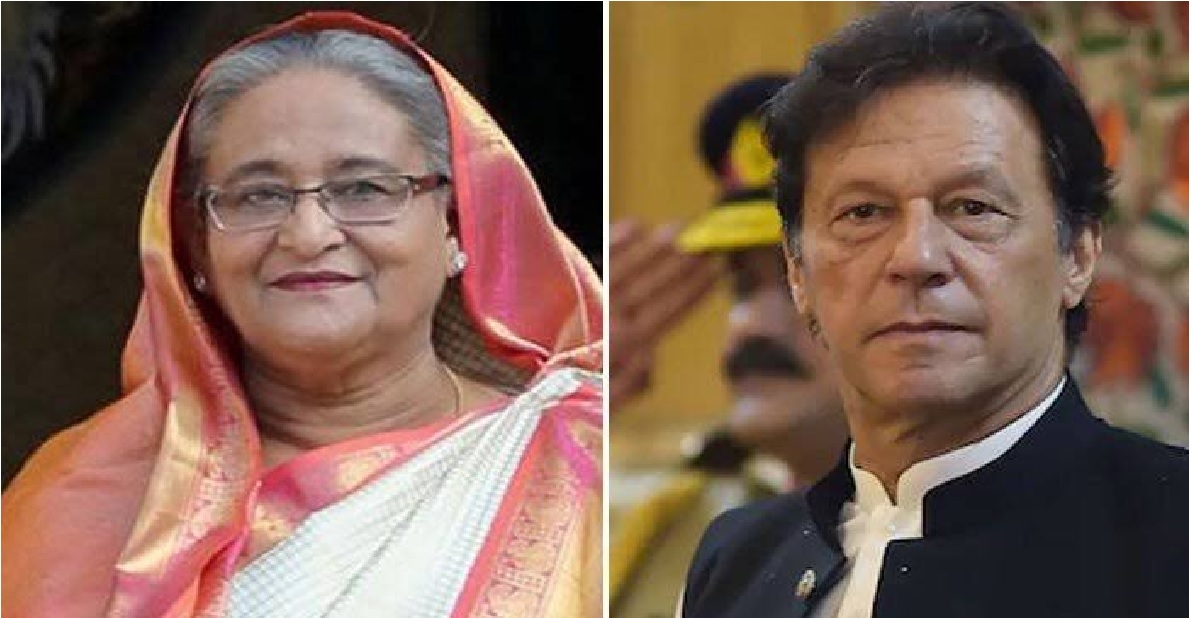The 1974 acceptance of Bangladesh led to cordial relations between the two lost brothers who had decided to go separate ways in the wake of the 1971 war. However, these warm relations took a nosedive when Sheikh Hasina, the daughter of former Prime Minister and founding father of Bangladesh Sheikh Mujibur Rehman, came to power for her second term in 2009.
Pakistan has always considered 1971 as a closed chapter after the tripartite agreement was signed in April 1974 to repatriate prisoners of war. However, Sheikh Hasina, in 2009, decided otherwise and resumed trial of the 1971 war crimes.
As a result, the relations between the two nations went sour. She was further emboldened when Prime Minister Modi came to power as she believed that she now had a supporter in New Delhi. Not to forget, India has been well-known for its patronage of Bangladesh over the years since the former supported the latter in its independence.
After coming to power in 2018, Prime Minister Imran Khan sought to maintain friendly relations with all the regional countries. In this bid, he also reached out to India for peace, but due to Mr. Modi’s other aspirations, this offer did not materialize. Similarly, in an effort to revive its relationship with Bangladesh, Pakistan appointed a new envoy, Imran Siddiqui, in February 2020, and the diplomatic efforts began.
International observers were caught in surprise when Mr. Siddiqi met Bangladesh’s Foreign Minister, A.K Abdul Momen, earlier in July this year. Consequently, the day finally came to which the Pakistani leadership was eagerly looking forward to. Prime Minister Imran Khan talked to his counterpart Sheikh Hasina in a rare call later in July.
PM Khan underscored the importance and desire to maintain warm and friendly relations and reaffirmed Pakistan’s commitment to SAARC and the importance of Pak-Bangladesh ties for regional peace and development.
A prominent newspaper of Bangladesh has said that the Prime Minister Sheikh Hasina did not meet India’s high commissioner despite repeated requests for a meeting in the last four months, one of several signs of strained relations with New Delhi and a shift for closer ties with Pakistan and China.
Despite India’s concern, Bangladesh has given the contract of building an airport terminal in Sylhet to a Chinese company. Indian High Commissioner Riva Ganguly Das tried for four months to get an appointment with the prime minister of Bangladesh but did not get it. Bangladesh has not even sent a note of appreciation to India in response to Indian assistance for the Covid-19 pandemic.
A similar move was recorded in Iran recently, which has decided to go ahead without India in a Chabahar Port railway project that the two countries had agreed to undertake together.
These developments come in the wake of the controversial Citizenship Amendment Act by the Indian government. Bangladesh fears that this bill would further corner the Muslim and Bengali communities living in India. Similarly, in another parallel development, China has been trying to forge friendly relations with Bangladesh to further build its dream of a shared future.
To build on this opportunity and counter Bangladeshi trade with India, China announced a tariff exemption for 97% of Bangladeshi exports. This move gave some 8200 Bangladeshi products duty-free access to the Chinese market. China has also been pouring money into infrastructure development projects in Bangladesh. These developments have created a window of opportunity to strengthen its ties with Bangladesh as it enjoys a very close relationship with China.
Whatever the reason for the change of heart, the fact is that Pakistan and Bangladesh must look beyond irritants and work to create a bilateral relationship based on mutual trust. The 1971 events were no doubt harrowing, but when Mujibur Rahman; Bangladesh’s founding father himself had agreed to move on, why insist on resurrecting these demons?
There should be an acknowledgment of the past, with Pakistan also examining its role in the 1971 debacle critically. The official release of the Hamoodur Rahman Commission report can be a starting point. This should be followed by a pledge from both sides to move forward and build a new future.
On August 14, Pakistan’s Independence Day, the country’s high commissioner to Bangladesh, Imran Siddiqui, in his speech, lauded the role that Bengalis played in its struggle for independence. This was preceded by a statement from Pakistan’s foreign office, which stated that Pakistan and Bangladesh were actively working and moving forward.
It has now become almost obvious that Pakistan and Bangladesh are in the same camp, with China leading from the front. This moment can be an opportunity for both countries to come closer to each other. Still, for that to happen, the two South Asian nations must be honest with each other so that they can capitalize on this moment to forge a lasting relationship. Regional cooperation and economic activities can help break down the walls of mistrust that currently stand in the way of better integration in the subcontinent.
The question is: are the states of South Asia willing to take a chance and work together to improve the lives of the nearly 2 billion inhabitants of this region? Or will the current rotten status quo prevail, and with it conflict, disease and illiteracy? Time will tell.

The author is doing M. Phil in Public Policy and Governance. He is working as a freelancer. Previously worked with HubPages and Washington Post.
